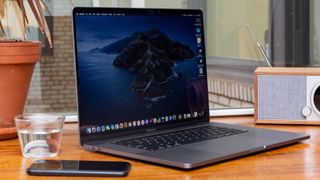MacBook Pro could get killer Apple Silicon performance based on new leak
ARM-based MacBook performance looks promising in this Geekbench 5 benchmark leak

Fresh benchmarks have leaked for Apple’s Mac mini Developer Transition Kit based on Apple’s own ARM-based chips, hinting at the performance to come.
The new Geekbench 5 benchmarks were discovered by 9to5Mac and show an A12Z Bionic chip, which powers the Developer Transition Kit, deliver a multi-core score of 4,555 and a single-core score of 1,098.
- Everything you need to know about Apple Silicon Macs
- macOS Big Sur: What's coming to your Mac this fall
- Just in: Massive leak reveals release date for iPhone 12, ARM Macs and more
Unsurprisingly that’s on par with the iPad Pro 2020, which also uses the same chip. And Geekbench 5 even records the result as one from an iPad Pro. But the mention of 16GB of memory show us that it’s actually a result for the Mac mini test kit; the latest iPad Pro has 6GB of memory.
While the benchmarks are on-par with the iPad Pro, they are the first out of the blocks to show what performance can be delivered when Geekbench 5 is applied natively to the Developer Transition Kit. Previous leaked results were delivered using virtualization via Apple's Rosetta 2 emulator, which can damage overall performance results.
Running Geekbench 5 natively on Apple’s ARM-based chips delivers more impressive results and give us an idea of the type of performance we can expect from macOS running on Apple Silicon — the initiative used by Cupertino to transition its Mac machines over from Intel processors to its own custom chips.
Compared to a 13-inch MacBook Pro with an Intel Core i5 chip, which puts in a Geekbench 5 score of 4,296 in the multi-core test and 1,107 in the single-core results, the ARM-based Mac mini achieves a competitive result.
And it’s worth noting that the Developer Transition Kit is merely a tool to help developers port their apps over from x86 architecture to ARM’s RISC architecture, which is why it’s using a standard A12Z Bionic system-on-a-chip. When Mac machines with the first true Apple Silicon chips arrive, we’re expecting to see more powerful chips that can make use of the greater power draw and space of a MacBok Pro, for example.
Sign up to get the BEST of Tom’s Guide direct to your inbox.
Upgrade your life with a daily dose of the biggest tech news, lifestyle hacks and our curated analysis. Be the first to know about cutting-edge gadgets and the hottest deals.
The first Mac machines with Apple Silicon are expected to have 12 cores, eight of which will be for performance while four take care of powering less demanding apps, as well as a custom GPU on the chip. If developers can ensure their apps will run effectively on ARM architecture, then we could be looking at powerful MacBooks and iMacs that no longer rely on Intel chips to deliver impressive performance.
The first Apple Silicon machines are expected this year, likely in the form of a new MacBook Pro. And a lot more are expected in 2021. Apple’s iPhone 12 might be an exciting phone, but Apple Silicon could prove to be the biggest thing to come out of Cupertino this year.
Roland Moore-Colyer a Managing Editor at Tom’s Guide with a focus on news, features and opinion articles. He often writes about gaming, phones, laptops and other bits of hardware; he’s also got an interest in cars. When not at his desk Roland can be found wandering around London, often with a look of curiosity on his face.
-
techconc I really don't understand why this is a story. The Geekbench 5 scores for the A12z chip were already widely understood from the iPad Pro. Yes, of course the new Apple Silicon chips will be much more powerful. We already know this.Reply -
aIysdexie A benchmark relates speed (instruction rate), not performance (task).Reply
Mac minis and MacBooks use more power (60s W and 30s W) than iPads (<10 W). The ARM CPU itself uses about 2 W, so no it's not more powerful.

